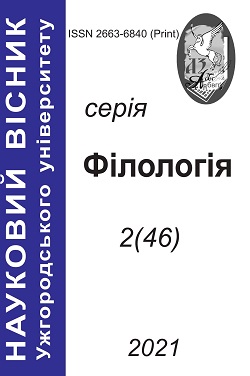КОГНІТИВНО-ОНОМАСІОЛОГІЧНИЙ АНАЛІЗ ОКАЗІОНАЛЬНОСТІ В АНГЛІЙСЬКІЙ МОВІ
DOI:
https://doi.org/10.24144/2663-6840.2021.2.(46).239-246Ключові слова:
occasionalism, concept, cognitive linguistics, onomasiology, word-formationАнотація
In the article the cognitive and onomasiological analyses of occasionality in English are implemented. The topicality of the research lies in the cognitive features of the emergence of individual authors’ neologisms, including “inten- tional speech and mental activity. The purpose of the article is to determine the processes of forming an occasional unit as a consequence of cognitive and mental activities of human mind. The objectives of the study include: the definition of the term concept, clarifying the structure of the occasional unit, considering cognitive and onomasiological analyses of the author’s innovation developing and stages of their generation in terms of cognitive onomasiology. Language and thinking are special and highly complex phenomena, a result of language and speech interaction. This is, first of all, a counteraction of two ten- dencies – the development of language and its preservation. To represent, reproduce and fix new ideas and concepts, language has to be replenished with new components. Occasionalisms play an important role in the language system, formed mainly for the purpose of artistic and stylistic nomination operating within a certain context. Cognitive and onomasiological analyses consider nonce-words in the process of conception, that makes it possible to dive into their mental depth. It is meant that the person who created a new word has an individual lexicon, which is the conceptual basis of any nomination in speech. A person chooses a certain unit of nomination depending on the extent to which his/her semantics satisfies the conceptualization that is being verbalized. Cognitive determinants for the emergence of neologism are associated primarily with the receipt, processing, storage and transmission of information. This approach enables revealing the cognitive factors that contribute the formation of occasionalisms. In this case, we proceed from the recognition of the role of a human being as the creator of the communication process and, ultimately, as the main subjective factor that determines the main trends in the language system. Thus, cognitive and onomasiological analyses are combined, as they involve the identification of motivational bases during the nomination and aims to establish the relationship between the name and the denoted object and contributes to a better understanding of occasionalisms.
Посилання
Алефиренко Н.Ф. Когнитивно-прагматическая субпарадигма науки о языке. Когнитивно-прагма- тические векторы современного языкознания: Сб. науч. трудов. Москва: Флинта; Наука, 2011. С. 16—27.
Архангельська А.М. До питання про засади побудови загальної ономасіологічної моделі номінації.
Мовознавство. 2007. № 4–5. С. 20–35.
Болдырев Н.Н. Интерпретирующая функция языка. Вестник Челябинского государственного университета. № 33. 2011. С. 11–16.
Болдырев Н.Н. Роль когнитивного контекста в интерпретации мира и знаний о мире. Вестник Челябинского государственного университета. № 6. 2014. С. 118–122.
Дмитрієв С.В. Когнітивно-ономасіологічний аналіз номінацій особи в сучасних українських соціолектах: : дис. канд. філолог. наук.: 10.02.01 / Одеський національний університет імені І.І. Мечникова. Одеса, 2015. 327 с.
Колоїз Ж.В. Неузуальне словотворення: монографія. Кривий Ріг: НПП Астерікс, 2015. 158 с.
Кубрякова Е.С. Теория номинации и словообразование. Языковая номинация. Виды наименований.
Москва: Наука, 1977. С. 222–303.
Кубрякова Е.С. Эволюция лингвистических идей во второй половине ХХ века (опыт парадигмального анализа). Язык и наука конца 20 века. Москва: Рос. гос. гуманит. ун-т, 1995. С. 144–238.
Кубрякова Е.С. В поисках сущности языка. Вопросы когнитивной лингвистики. ИЯ РАН, Тамбов.
№1. 2009. С. 5–12.
Кубрякова Е.С. Язык и знание. На пути получения знаний о языке: части речи с когнитивной точки зрения. Роль языка в познании мира. Москва: Языки славянской культуры, 2004. 560 c.
Никитченко К.П. Лінгвокогнітивна природа способів оказіонального словотворення в англомовному постмодерністському художньому тексті: дис. канд. філолог. наук: 10.02.04 / Одеський національний університет ім. І.І. Мечнікова. Одеса, 2017. 274 с.
Полюжин М.М. Поняття, концепт та його структура. Науковий вісник Східноєвропейського національного університету імені Лесі Українки. Філологічні науки. Мовознавство. 2015. № 4. С. 214–224.
Полюжин М.М. Об основных направлениях и процедурах лингвоконцептуального исследования. Материалы Международного конгресса по когнитивной лингвистике: сборник научных статей. Москва: Ин-т языкознания РАН; Тамбов: Издательский дом ТГУ им. Г.Р. Державина, 2017. С. 170–173.
Селиванова Е.А. Когнитивная ономасиология: монография. К.: Изд-во украинского фитосоциологического центра, 2000. 248 с.
Селиванова Е.А. Ономасиологическая связность как фактор концептуализации художественного текста. Уч. зап. Таврического национального университета им. В.И. Вернадского. Сер. «Филология». Симферополь, 2006. Т. 19 (58). С. 242–246.
Селиванова Е.А. Номинация и когниция: новая типология мотивации языковых единиц. Когниция, коммуникация, дискурс. Филология. 2011. № 3. С. 64–85.
Серебренников Б.А. Языковая номинация. Общие вопросы: монография Москва: Наука, 1977. 358 с.
Телия В.Н. Типы языковых значений. Связанное значение в языке: дис. д. филол. наук: 10.02.19 / Москва: Наука, 1981. 269 с.
Улуханов И.С. О степенях словообразовательной мотивированности слов. Вопросы языкознания. 1992. № 5. С. 74–89.
Умеренкова А.В. Концептуальная интеграция как когнитивная база мифотворческой деятельности.
Когнитивные исследования языка. 2017. № 30. С. 196–198.
Четина М.М. Когнитивный анализ окказиональной номинации (на материале прозы Дж. Фаулза).
Творчество молодых ученых. 2010. C. 155–158.
Blank A. Historical semantics and cognition. Berlin, New York: Mouton De Gruyter. 1999. 312 p.
Minsky M. Society of mind. New York: Simon and Schuster. 1988. 336 p.
Niffenegger A. The Time Traveler’s Wife: A Novel. Orlando: Harvest Book. 2003. 546 p.
Vygotsky L.S. The dynamics of the schoolchild’s mental development in relation to teaching and learn- ing. Journal of cognitive education and psychology. Vols. 10–2. 2011. P. 198–211.

